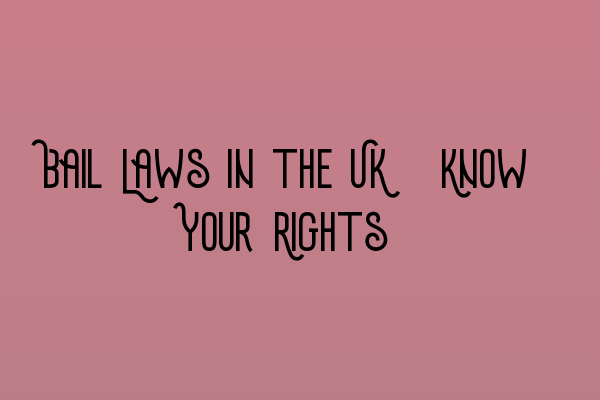Bail Laws in the UK: Know Your Rights
Introduction
Being arrested or charged with a criminal offense can be a stressful and overwhelming experience. One aspect of the legal process that individuals often have concerns about is bail. Understanding your rights and the bail laws in the UK is crucial during this challenging time. In this article, we will provide you with a clear overview of UK bail laws, ensuring you are well-informed and can navigate the process with confidence.
What is Bail?
Bail is the temporary release of an accused person before their trial or hearing. It serves as a guarantee that the individual will return to court on the specified date. Bail can be granted with conditions, such as electronic monitoring or travel restrictions, to ensure the safety of the public and prevent potential reoffending.
Types of Bail in the UK
In the UK, there are several types of bail arrangements:
- Police Bail: This is granted during the investigation stage, allowing the individual to remain at liberty while inquiries are ongoing.
- Court Bail: This is granted by a court after arrest or charge, ensuring the accused person’s presence at future court proceedings.
- Conditional Bail: This type of bail imposes certain conditions on the individual, such as reporting to a police station or residing at a specific address.
- Unconditional Bail: This is granted without any conditions and allows the accused person to remain at liberty until their trial or hearing.
Conditions for Granting Bail
When determining whether to grant bail, the court considers various factors:
- The seriousness of the offense
- The likelihood of the accused person fleeing or failing to attend court
- The potential danger posed to the public if released
- The accused person’s criminal record
- Whether the accused person has previously breached bail conditions
It’s important to note that each case is unique, and the court makes a decision based on the specific circumstances presented.
Your Rights
As an accused person, you have certain rights regarding bail:
- The right to apply for bail: You can make a bail application to the court.
- The right to legal representation: It is advised to seek legal advice and representation to assist you in the bail application process.
- The right to challenge bail conditions: If conditions are imposed, you have the right to challenge them if you believe they are unjust or unnecessary.
Conclusion
Understanding your rights and the bail laws in the UK is crucial when navigating the criminal justice system. This article has provided you with a clear overview of what bail is, the types of bail in the UK, conditions for granting bail, and your rights as an accused person. By being well-informed, you can approach the bail process with confidence and ensure that your rights are protected.
